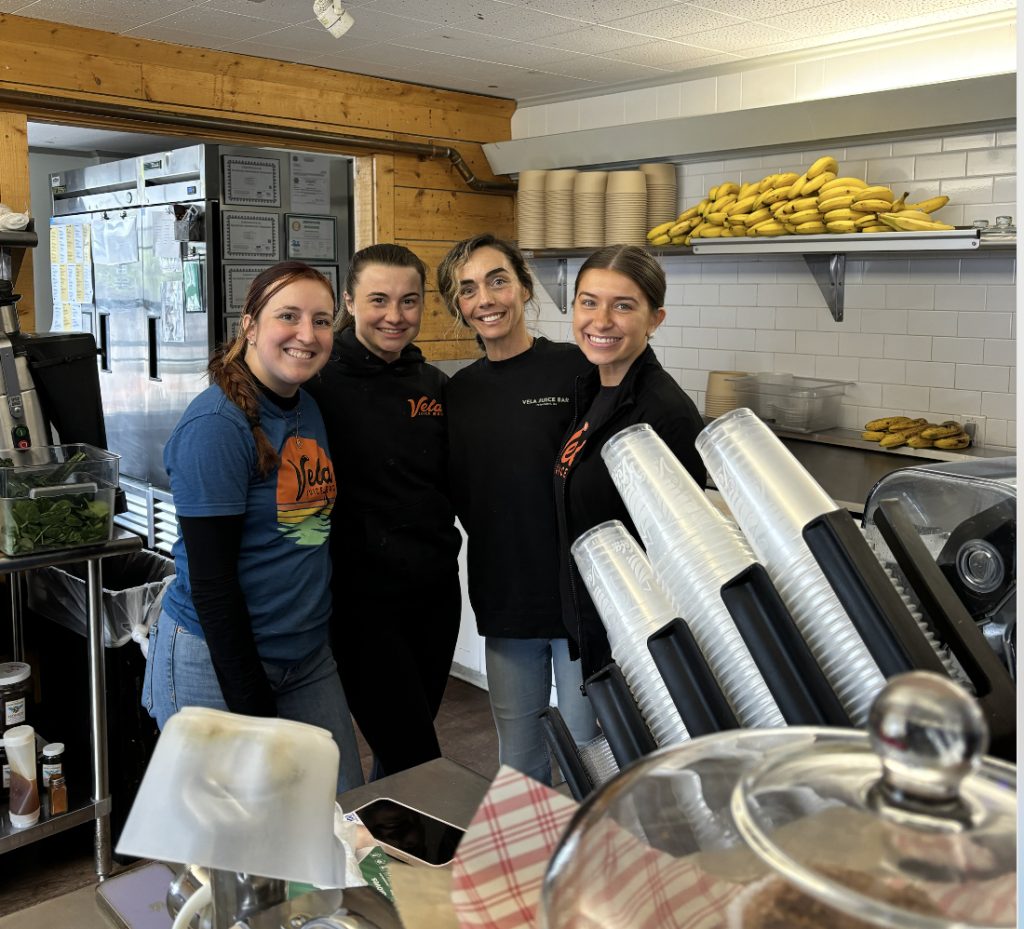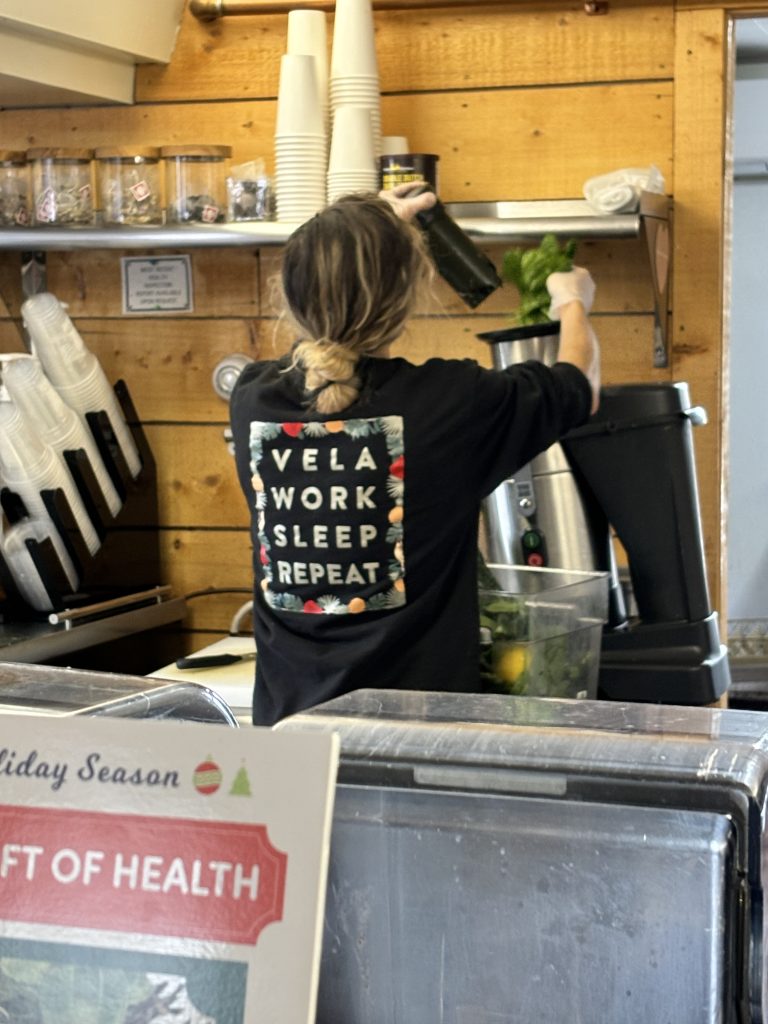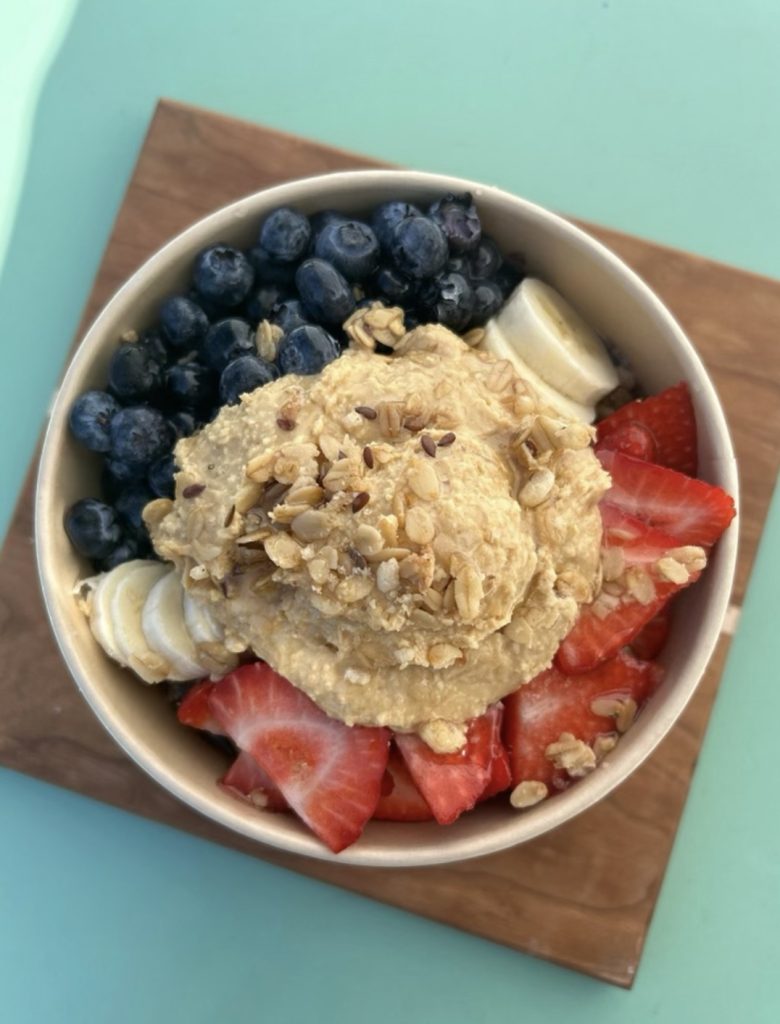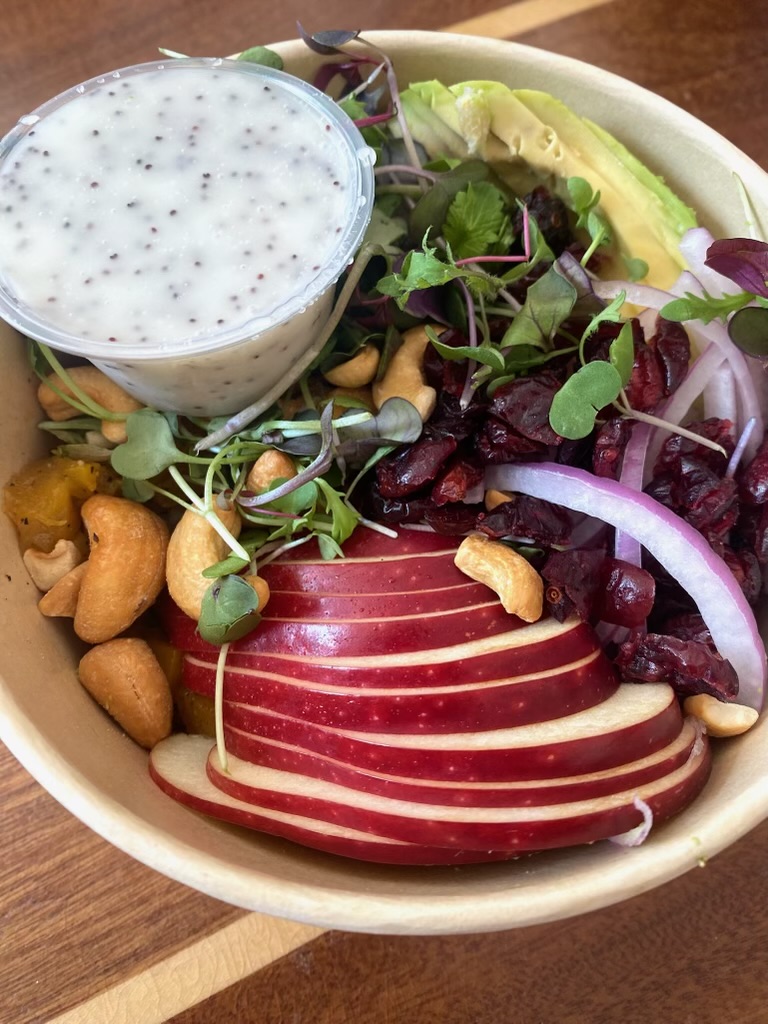The first thing to know about Vela Juice Bar is how to pronounce its name – with a soft E, like, fella. The word derives from “velum,” which means “sail of a ship” in Latin.
“I wanted something that was different from your typical juice bar,” says Ana Walsh, who earlier this year set sail as solo owner of the popular 71 Court St. shop after an amicable dissolution of an eight-year partnership with Daniel Gallivan.
“I have a passion for boating and sailing,” Walsh says. “I sailed down at the [Plymouth] Yacht Club and met my husband there. He built the shop’s bar, which is made of teak and holly. So it’s just like when you walk down below in a sailboat and you see that beautiful flooring.”
More precisely, it’s like a sailboat equipped with commercial-strength juicers and blenders, and enough produce to impress a Haymarket vendor.
Vela is a downtown staple today, but when it opened the concept was kind of novel for downtown, where to-go breakfast and lunch options were – and remain – limited. A lot of places serve faux smoothies and juice drinks, but making the real deal requires quality control, pricey ingredients, and skill, not to mention a lot of equipment maintenance. What’s on the menu at Vela is what’s in the drink. There are no fillers, added sugar, or sickly-sweet syrups. For example, the best-selling Pumped Up smoothie is made with strawberries, bananas, house-made peanut butter, cacao nibs, almond milk, and whey or plant protein. For the winter, there’s a vegan Eggnog Smoothie, along with Peppermint Chocolate and Gingerbread smoothie specials. On the juice side, the Green Monster is a blend of spinach, kale, mint, apples, lemon, celery, and cucumber, while the Buzzards Brew is loaded with carrot, pineapple, orange, apple, and mighty turmeric. I feel healthier just typing that.
And don’t forget those formidable acai bowls. (It’s pronounced “a-sigh-ee,” by the way. You’re welcome.)
Over the years, Vela’s menu has expanded to include gluten free and vegan baked goods, wraps, sandwiches (we’re partial to the spicy veggie burger), gourmet toasts, soups, and a lot more.
Walsh sat down to speak with me on a recent morning as the juicer and blender whirred and the lunch time rush loomed.
This conversation has been edited for clarity and length.
What were you doing before Vela?
I was in the nonprofit world. My first job out of college was at the Joslin Diabetes Center [in Boston]. Then I moved to Hoboken, New Jersey, and worked for the American Red Cross. After a handful of years of nonprofit experience, I went to work for a nonprofit consulting firm. I traveled throughout the country raising money for capital campaigns, like for a new wing of a hospital. When you’re traveling and living out of a bag every week, it’s difficult to eat healthy. When I started going to bigger cities, I sought out juice bars. Then I had my juicer and blender at home.
It’s where the idea to open a business came from?
I was kind of like, Plymouth needs this. I love this concept. I want to do this. My husband, who was my boyfriend at the time, said, “You need to get a commercial juicer.” So he bought a used one on eBay. There I was in our 900-square-foot apartment, a third floor walk-up on Brewster Street, testing my recipes at home.
That’s when you found a business partner?
Yes, Dan Gallivan, he was a friend with a background in culinary and real estate businesses. With my background in marketing, we looked at each other and said, “Why don’t we do this together?” The following week we had coffee and it was kind of matter of fact – not if we were going to do it, but when. At the time I was 30 or 31 years old and it was one of those things: if I don’t do it now, when am I going to? As a woman, if you were to have a family, things really change and evolve.
Issues that don’t factor into most men’s career decisions.
It’s different. I think that culturally we’re growing [in terms of] family roles, but I knew it would be one of those things that I’d regret and I’d rather take the chance. Now I have a two-and-a half-year-old and a one-year-old.

You found this space, eventually opened it, and business took off. But not that long ago, you and Dan went separate ways. What happened?
We had a great partnership and we’re still very friendly. About a year ago, he kind of lost interest. He had other obligations to tend to. We had an honest conversation about the future and he decided he wanted out. This was my opportunity. I’m not going to say it wasn’t difficult – being a mother to two [children], including an infant, and coming out of Covid on top of it. Having my own business, it’s not like I get maternity leave. But I do get different kinds of flexibility that are great for my lifestyle and family.
Opportunities often don’t pop up at convenient times.
Right. I was multitasking many things between the business and home while Dan was exiting, which was officially at the end of May. This was my first summer without a business partner, but the team here completely stepped up. I really lean on my shift leaders and give them the opportunity to empower themselves, to let them focus on their particular interests or strengths.
I was going to ask about that – recruiting and retaining employees.
It’s been about building a culture where people want to be and work. If you have a team that wants to be here, it’s infectious. The customers notice.
Many businesses since the pandemic have not been able to do that.
I think I’m very fair to my employees. I treat them like my friends. I want to make sure they’re happy in what they’re doing. I’ve had people who leave and then they come back. That’s a good sign. Some of the people who work here, they went to school for graphic design or business management or art. They are able to draw on those talents and that helps make their job interesting.
And helps to make Vela profitable?
I’m not in this to become super rich. I live in a small house. I’m able to pay my bills. My kids are healthy. My husband’s healthy. He goes to work. What’s better than that? You know, I’m in a community that I love. I feel like I’ve won the lottery.
Back to the pandemic, this seems like a business that was set up to sustain itself during those times.
When the pandemic happened, we had just opened [a second location in] Buzzards Bay, which now is closed.
Is that something you regret?
I regret the timing. We opened Buzzards Bay five months before Covid and then all the kids at Mass Maritime got sent home. We thought we could be part of revitalization of that area. We thought the strategic plan made sense. Nobody saw Covid coming. It was an uphill battle for three years. We closed in September 2022. I was due to have my second child in December. And it was a time when finding good employees was difficult. A positive that came out of Covid was the pick-up window [at the Plymouth shop]. Another one was we developed an app.
Like many businesses, you also cut back on hours.
Yes. The hours are 8:30 a.m. to 3:30 p.m., seven days a week, every single day of the year, other than Christmas, Thanksgiving, and Easter. The nice part is that the team for the day is the team for the day. When we started, we were open 7 a.m. to 7 p.m. Dan and I would be here at about five o’clock in the morning. We joked that we should have cots in the back. After 3:30, people are into school activities, they’re thinking about what they’re going to have for dinner – not to say that Vela wouldn’t be a great grab-and-go dinner option. But I also want people to go to The Tasty, I want people to go to Mallebar, I want people to go to Speedwell. We have amazing options in town.
It’s that critical mass thing – everybody benefits.
Yeah, and the hours are better for my lifestyle, and for my employees’ work-life balance, too. Being able to go home at four is nice.

Unlike a gift shop, the product you stock has a short shelf life. Quality control must be a constant challenge.
I get produce deliveries every single day because I want it fresh. The shift leaders are trained on how to order the right amount. It’s a careful balance of not over-ordering or under-ordering so that produce is moving quickly out the door.
What are the most fragile ingredients?
Spinach, kale, those kind of things. Avocados can arrive in different stages of ripeness. When we get them really hard we know it’s going to take three days for them to turn. You need to order for three days [out] and let them sit.
What about food waste?
There’s very little food waste. To the point that all of the compost that comes out of the juicer, if someone has chickens or a farm at home, we will give them that for free. They say their chickens love it.
And, of course, food costs have gone up.
Right, and things go up depending on the season. Strawberries, blueberries – if it’s not summer, it can get crazy. Double the cost.
As a result, you’ve had to raise prices.
We’ve raised them, but everyone has, and I’m certainly sensitive to how far we can push the needle. I mean, I don’t want to raise prices. Over the summer, I actually increased all of the smoothie sizes. I thought that if I had to raise prices, let’s give them a little more. And when you get one of our salads, they will feed two or three people. I always make sure that [the size] is generous.

Tell me about the making of a smoothie. It’s labor intensive, especially with cleaning and maintenance. It’s the reason most of us don’t make smoothies all the time at home.
Especially with home juicers that aren’t commercial [grade]. The peels really get in the way, even in the apples, because the juicers are not as efficient.
How often do you have to deep clean the equipment?
The juicer gets cleaned every single day. It comes apart like a puzzle. There’s just layers and layers inside of it.
Any tips on the proper process for using a juicer?
You want to put the roots through first. Because that’s harder to squeeze out. If you have ginger or turmeric, that should be going through first. If you have any leafy greens, they should be going through early. And then, you put through something like a cucumber – all that juice and water is going to really push through the flavor. There’s an absolute method and science to it. Not every banana or cucumber is exactly the same. You do have to finesse it.
Customers expect consistency.
Absolutely. No customer should ever know if I make a drink or someone else makes it. No one should have to come in and say, “I hope Mary makes it, I hope Rachel makes it.”

Have customer preferences changed over the years?
The Pumped Up [smoothie] has always been popular. You do get a lot of bang for your buck – the homemade peanut butter the plant or whey protein. It’s definitely really filling. Strawberries add a little sweetness to it. The Harvest Barley Bowl is a really popular item. It’s great for your heart, it has cashews, greens, squash, apples, and cranberries. It’s divine.
You’re making me hungry. Let’s switch to talking about the economic climate in town. Some people say the town could be more business-friendly.
I think the Plymouth Area Chamber of Commerce is fantastic. They offer so many different opportunities. They are super supportive when you want them to be.
Is this end of the downtown district more challenging in terms of getting walk-in customers?
I like being down this end. When I moved in here, The Artisan Pig wasn’t here, The Tasty wasn’t here. HeyDay Supply wasn’t here – that’s a cute shop.
What has to happen for this part of town to become more of a destination?
Plymouth in some ways has been undiscovered. With the combination of the harbor, the historic district, downtown, it’s been kind of like, ‘Why hasn’t this happened sooner?’ But it is now.
You’re not the first one to say that to me.
We’re starting to get on the map with some really nice restaurants. There were no nicer apartments for a while, either, and those exist now. If we’re going to continue to grow, infrastructure really needs to be looked at. We don’t want to get too big, but we’re on a great path. There’s a lot of opportunity. People in surrounding towns are coming here to work, they’re coming here to play. People are driving anywhere from 30 minutes to an hour for the experience in Plymouth.
And they expect that experience to be at a certain level.
Exactly, more and more. I used to always say that Plymouth could be the Newport of South Shore. Change is inevitable. We just have to do it right.
Mark Pothier can be reached at mark@plymouthindependent.org. Email him suggestions for the We Have Questions column.

